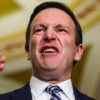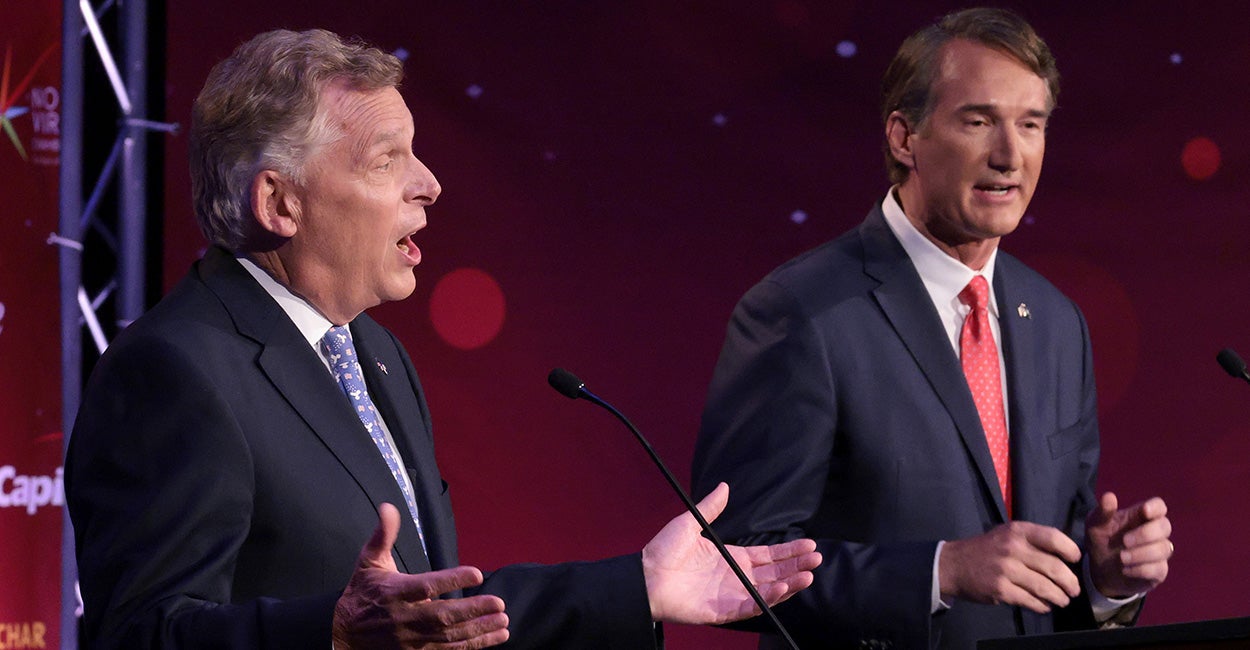It’s Election Day in Virginia, and no issue has captured the attention of voters in the Old Dominion more than education.
Battles between school boards and frustrated parents have attracted national attention, and led to a close race for governor.
Ian Prior, a Loudoun County, Virginia, father and executive director of parents-based grassroots organization Fight for Schools, feels the enthusiasm that parents engaged in their children’s education are bringing to the election.
The Daily Signal depends on the support of readers like you. Donate now
“Parents have this burning fire inside of them to protect their children, and it’s almost a bit of a hero’s journey, like Joseph Campbell, where they have really risen to the occasion and have found skills and strength within them that they may not have known that they’ve had, and that is really what this movement is about,” he says. “It’s about parents that have found that inner strength and are willing to put it all on the line.”
Prior joins the show to discuss how education took center stage in the race, and implications for parents’ rights in their child’s education.
We also cover these stories:
- President Joe Biden warns that unless immediate and definitive collective action is taken by the world, the “existential threat” of climate change could destroy people’s lives and livelihoods.
- Demonstrators for and against abortion stand outside the Supreme Court as the justices hear arguments on Texas’ heartbeat abortion law.
- Philadelphia becomes the first city to end traffic stops for minor infractions.
Listen to the podcast below or read the lightly edited transcript.
Doug Blair: Our guest today is Ian Prior, executive director of nonpartisan, parents-based grassroots organization Fight for Schools and a dad from Loudoun County, Virginia. Ian, thanks so much for joining us.
Ian Prior: Thanks for having me, Doug.
Blair: As we are recording this, today is Election Day in Virginia. The state will elect its next governor, other statewide officials and candidates for the General Assembly. Unlike in other elections, education has really come to dominate the field in this election cycle. So what is the energy right now on the ground like regarding schools? What does the atmosphere feel like?
Prior: It’s massive energy from parents all across Northern Virginia, for sure. I was at a school board meeting last week. I think there were 121 people signed up to speak in person. We all waited outside in the cold. They don’t let you go in and use the bathroom so you have to wait outside.
We had a big screen as we were watching the speakers. We actually put a camera in there this time so that we could get the speakers’ faces out there. And I’ve seen parents that I never saw before go and speak at the school board meeting, demanding accountability.
We talked a little bit before we started this podcast on the fact that the Loudoun County School Board essentially covered up a sexual assault to pass a political policy, and that has really unified parents across the political spectrum because it doesn’t really matter, ultimately, what the policies that they’re passing are in this case, what matters is that they’re passing politically expedient policies and they’re not being accountable and the results are student safety is compromised.
Blair: It seems like at the beginning of this race, education was not the focus. So can you maybe walk our listeners through what changed and how it proceeded to become more about education from what it was about before?
Prior: Well, like any good superhero movie, I’ll start with the origin story. Last year, you had a bunch of parents, again, Democrats, Republicans, trying to get schools reopened. Loudoun County was far behind other school systems in the country with letting kids back in school and these parents were dedicated, they were organized. They went to school board meetings, they wrote their local elected official, and they were actually able to help make change at the General Assembly and a law that now required that schools be open this year.
The next inflection point, though, was in March of this year where you had a viewpoint-restricted closed Facebook group, which had six school board members and the commonwealth attorney for Loudoun County participating. And one of those school board members put out a call to these activists, which were about 600 or 700 people, to start pushing against parents that were opposed to critical race theory.
What happened next was that somebody went in there and said, “Here’s how we’re going to do it. We’re going to infiltrate their groups. We’re going to publicly expose them. We’re going to hack their websites.” Another person said, “Well, here’s how we’re going to list the names: first name, last name, area of residence, school board member.” And they proceeded to list between 60 and 70 parents in the community to be canceled.
And most of those parents actually had just been going to school board meetings to speak up for opening schools. Funnily enough, I was put on their twice. Once for writing an article on The Federalist and a second time for “going to a school board meeting and expressing First Amendment concerns.” And I think that just says it all.
So that really was the beginning of the idea of Fight for Schools, which we call a back-deck pack because there were about eight of us that met on somebody’s back deck and it was a combination of people that were in the open schools movement and people that had been put on this list. And we decided we were going to start Fight for Schools, we were going to focus on local school board elections.
And the legal rationale was that they violated open meeting laws, they violated their own code of conduct, and they did nothing when parents spoke out and said, “Where are you? How have you not come out and said, ‘Listen, we apologize for of this’?” They never took accountability and they still haven’t. In the course of these seven months, they still haven’t.
The next one, and we talked a little bit about this off the air, was, you had a teacher named Tanner Cross who went to a school board meeting as a citizen of Loudoun County and spoke out against a proposed policy that would require teachers and students to refer to other students by their preferred pronouns. It would also allow for students to use whichever bathroom of the gender they identify with. They put him on administrative leave. He ended up winning his case at circuit court and fought back a frivolous appeal by Loudoun County Public Schools and it just brought more people to the table that wanted to push back.
Blair: President Obama, when he was campaigning in Virginia, he talked about education and specifically mentioned phony, trumped-up culture wars. On a similar note, what did you think of those statements? And then I’m also curious if you heard anything from other parents, what their impression about that was?
Prior: I thought President Obama’s statements were just offensive, specifically because on that very day, the individual that sexually assaulted a girl at a high school in a bathroom was convicted. So he’s out there talking about trumped-up conspiracy theories, so does he know more about what’s happening in my kids’ schools than I do? Does he know more than the other parents what is happening in their schools? Of course he doesn’t.
That is just some sheet music that Terry McAuliffe’s campaign and the DNC gave to him to go out there and say something and try and make this about anything other than the facts. And the facts are that parents are seeing what is happening. You have a school system in Loudoun County that spent $500,000 for a report on systemic racism, yet they still can’t bring themselves to fund an independent investigation into what happened with this sexual assault cover-up.
Blair: Now, school boards and relationships with parents have been getting quite a bit of attention nationally, not just in Loudoun County, but across the country. Have you heard anything from other parent groups or other organizations that have been dealing with these sort of school board meetings and school board associations in other states?
Prior: Yeah, I mean, all the time. We get emails from people across the country: “How do we do what you’re doing?” And it’s a little tough because we’ve been blessed with a school board that continues to make mistake after mistake after mistake, and with those mistakes are opportunities to highlight exactly what they’re doing wrong.
So I don’t know that every school board in the country is as bad as Loudoun County Public Schools or as politically incompetent as Loudoun County Public Schools, but I do think that parents getting involved, going and speaking at their local school board meetings, it’s like a “Hoosiers” moment.
Remember the scene from “Hoosiers” where he’s like, “If coach goes, I go. If he stays, I stay.” Or like in “Footloose.” I mean, this is what the country is founded on, which is local issues where people can go and debate them in front of their elected officials, and we need to get back to that.
And I think that what we’ve seen over the summer is an unwillingness from these elected officials to collaborate with parents and to collaborate with their constituency. They’ve got to figure out how to get it right because this issue is not going away.
Blair: I want to go back to something that we talked about briefly, about this story about this boy who raped a girl in a girls locker room or a girls bathroom who was wearing a skirt. And then later on, he was moved to another school. As you mentioned, he’s been convicted. But I’m curious as to what was the reaction from the parents and from folks in Loudoun County maybe who weren’t as engaged with this beforehand. What happened after they heard about this?
Prior: Well, I think the first reaction was outrage. We have been highlighting the deficiencies of this school board and this superintendent for months and I think people that may not have been engaged realize, “Hey, I think those parents were right. This is what they’ve been warning about.” The other thing that we’ve seen is people coming out and saying, “My friend was sexually assaulted. My daughter was sexually assaulted.”
They’re not focusing on this core issue of student safety and I think that it is an extremely unfortunate thing that happened that we had one girl that was sexually assaulted in the bathroom and now an allegation that this individual went to a different school and sexually assaulted someone else.
But to pull a positive—if you can—out of this situation, is that kids and students and parents are going to be more vocal about this issue and I think that is important because we need to make sure that our schools are safe for our daughters and our sons and that sexual assault is treated seriously and that schools focus on things like this, not on becoming social justice activists.
Blair: I want to really hammer in on that term “safety” here because we’ve been hearing a lot about safety in terms of school boards. Some of the school boards feel like they’re being threatened. In a relatively infamous letter now, Attorney General Merrick Garland issued a statement to the FBI, asking them to coordinate with local school boards and local authorities to comment on domestic terrorism and stuff like that with parents. He has decided that he will not be walking back that initial memo. What does that say to you about their priorities?
Prior: Well, a couple of things. I’ve gotten to read a lot of these emails that have gone to school board members and some of them are horrible and they really kind of tick me off because that’s not how you operate. If you’re going to email them, be substantive. But they’re also not credible threats.
And so, for the attorney general of the United States to collaborate with the White House, the National School Boards Association, to put out this memo in record time—and I think Sen. [Mike] Lee brought that up, how quickly that memo was put out after the NSBA school board letter—it just shows that the priorities of this administration are more of the same. It’s politics of division: “We want to silence people. We want to cancel people. We don’t want to hear a different point of view.” And that has, unfortunately, been the trend in our politics for the past decade or so.
But I do think that this issue, when we’re talking about education and our children, safety, what they’re learning, is a unifying issue that can actually push back against this politics of division and hopefully bring us to a place where people will focus on issues and less on, “Are you a Democrat or are you a Republican? Are you this or are you that?” They’ll focus less on the divisions and more on the unification of parents around this issue.
Blair: Do parents and children feel safe in Loudoun County these days? I almost wonder if there’s this idea that parents don’t feel like their children are safe based on these policies that are coming out.
Prior: Yeah, I think they don’t. I think that’s what we’ve seen over the past month, is that parents are afraid to send their kids to schools. I mean, some parents tell their kids, “Don’t go to the bathroom at school.” And that’s unfortunate.
Look, they passed this transgender bathroom policy and they said, “Well, the state required us to do it.” Well, I looked at the law and I’ve studied the law. The law’s pretty vague.
I mean, they could have passed this policy, gotten stakeholders together … people that opposed the policy, got different ideas on how to craft a policy that still respects people’s First Amendment rights, their rights to religious freedom, their safety, concerns of parents, and they still could have done it, but they didn’t care. They wanted to pass their political agenda the way they wanted to pass it and as a result, you have parents that are concerned with the safety of their children.
Blair: Seeing that you’ve been doing this for as long as you have been, what have you learned during your time as the leader for Fight for Schools? And then, what can parents in other states do to make sure that their parental rights to be a part of their child’s education are being respected?
Prior: I think the thing that I’ve learned is that parents have this burning fire inside of them to protect their children and it’s almost a bit of a hero’s journey, like Joseph Campbell, where they have really risen to the occasion and have found skills and strength within them that they may not have known that they’ve had. And that is really what this movement is about. It’s about parents that have found that inner strength and are willing to put it all on the line.
They go out there, they put on their suit of armor, they take slings and arrows from the media, from their own school board members, from the attorney general of the United States, from social justice activists. But you know what? We’re still here and we’re still going to be here, no matter what happens with any elections, we’re still going to keep fighting to make sure our children are learning what they need to learn to be mentally tough adults that can operate in the real world and be successful and be safe while they’re learning.
Blair: Ian, before we wrap-up, I want to give you the opportunity to let our listeners know, if they want to learn more about what you guys are doing and maybe how they can get involved, where should they go?
Prior: They should go to fightforschools.com. Sign up for our emails. If you want to donate, that’d be great too. We do have to pay for lawyers to be in court with these school board members.
And I’d say pay attention. Go to school board meetings, watch them. If you can’t go speak, go attend. Find out what’s going on and make sure that when your school board members are up for reelection, that you vote and that you know the issues. Don’t just rely on their nicely crafted websites and statements. Go out there, talk to them. Ask them the questions that need to be answered.
Blair: Well, that was fantastic. That was Ian Prior, executive director of nonpartisan, parent-based grassroots organization Fight for Schools and a dad from Loudoun County, Virginia. Ian, it’s always a pleasure talking to you.
Prior: Thanks a lot, Doug.
Have an opinion about this article? To sound off, please email letters@DailySignal.com and we’ll consider publishing your edited remarks in our regular “We Hear You” feature. Remember to include the URL or headline of the article plus your name and town and/or state.






























